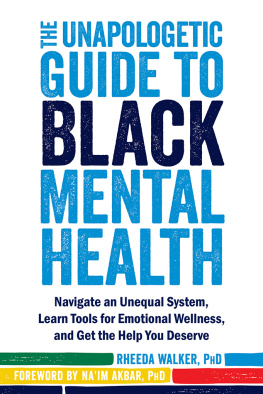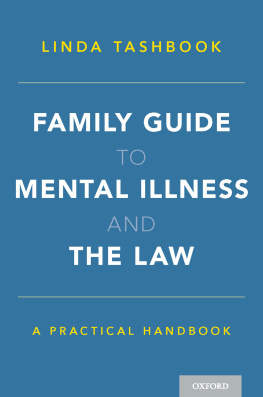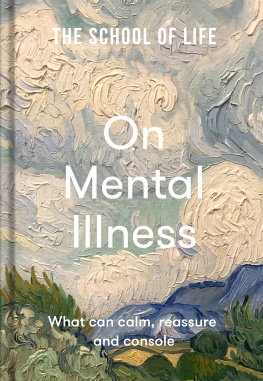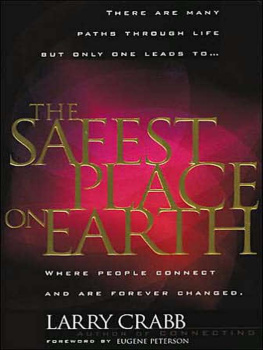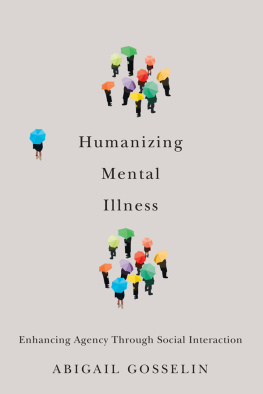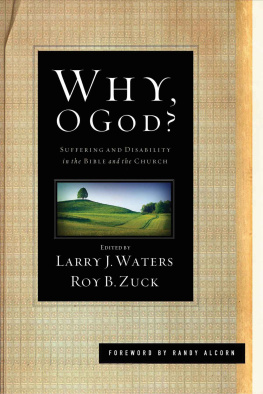Mental Illness and Your Town: 37 Ways for Communities to Help and Heal
Copyright 2009 by Larry Hayes. All Rights Reserved.
Author information at www.CommunityMentalHealth.US
No part of this publication may be reproduced, transmitted in any form or by any means, electronic, mechanical, photocopying, recording, or otherwise, or stored in a retrieval system, without the prior written consent of the publisher.
Library of Congress Cataloging-in-Publication Data
Hayes, Larry, 1938-
Mental illness and your town : 37 ways for communities to help and heal / Larry Hayes.
p. cm.
Includes bibliographical references and index.
ISBN-13: 978-1-932690-76-7 (trade paper : alk. paper)
ISBN-10: 1-932690-76-X (trade paper : alk. paper)
1. Community mental health services--United States. I. Title.
RA790.6.H39 2009
362.20425--dc22
2008037204
| Published by: |
| Loving Healing Press | www.LovingHealing.com |
| 5145 Pontiac Trail |
| Ann Arbor, MI 48105 | Toll Free 888 761 6268 |
| USA | Fax 734 663 6861 |
Praise for Mental Illness and Your Town
With a father's wit and a reporter's well-honed writing skills, Larry Hayes uses his family's story to offer practical suggestions about how communities can help persons with mental illnesses recover and thrive. This is a wonderful blueprint that spells out ways to change lives and help persons seldom seen or heard.
Pete Earley, author, CRAZY: A Father's Search
Through America's Mental Health Madness.
Larry Hayeswith his background as a journalist, advocate, and parentunderstands the challenges that communities face in understanding mental illness. This book outlines the opportunities and proven stepswe all can take to help get this illness out of the shadows and into broad daylight. Larry helped make my city a much healthier place because of his work on mental illnesshis book can help do the same for other communities.
Paul Helmke, President, Brady Center/Campaign to
Prevent Gun Violence, Former Mayor of Fort Wayne, IN
Larry Hayes demonstrates in this book a very rare gift that he has, the ability to reduce complex social problems to simple terms. In addition, he fills the book with practical solutions and ways to reduce the sometimes debilitating effects of mental illness. These will help victims and communities alike to address this reality, that We only help a fraction of those who need help.
James C. Howell, Ph.D.,
juvenile justice researcher
Like me, Hayes has a history of major depression he has overcome. He is open about this, and about his son's suffering from a major mental health problem. But this is not a poor me story. Rather, it is one of hope and self-empowerment. Hayes is on a mission: to remove the stigma associated with mental disorders, to lead sufferers and their families to self-respect and justice. In these pages, he shows you how you can do the same in your community.
Bob Rich, PhD., author, Anger and Anxiety: Be
in Charge of Your Emotions and Control Phobias
In Mental Illness and Your Town, Larry Hayes uses his considerable experience as an editorial writer and mental health advocate to show communities what they can do to help the cause of mental illness. Frequently using illustrations from his own experience and his family's experience with mental illness, he gives realistic, substantive and effective examples of what helps and what does not help in a myriad of different areas of society, virtually blasting negative stigma away. The sheer number of good ideas in this document makes it a treasure for any mental health advocate or group. Included is a primer on how to be an effective advocate that is a gem in itself. I can't recommend this book too highly.
Rev. Barbara F. Meyers, Mental Health Minister,
Mission Peak Unitarian Universalist
Congregation, Fremont, CA
Larry Hayes provides families with a real self-help manual that is personal and compassionate, yet practical and hands-on. In my years in the field, I have not seen a book like it. It is long overdue and can only come from someone who has been therein the trenches. Larry certainly has.
Stephen C. McCaffrey, President
Mental Health America of Indiana
I loved reading and learning from this book. I share Larry Hayes views that we can win the battle against depression, bipolar, and other related disorders if we succeed in counteracting stigma, disseminating knowledge, and enlisting entire communities in the effort. Long ago, I learned that athletes, performers, and everyday citizens who talk about these conditions in matter-of-fact language and with supportive advice become powerful voices in this struggle. Larry Hayes has provided a roadmap as to how to win this struggle. Working together we will do so.
John F. Greden, M.D.
Upjohn Prof. of Psychiatry and Clinical Neurosciences
Exec. Director, Univ. of Michigan Depression Center
In Mental Illness and Your Town, Larry Hayes has chronicled many great ideas on how communities can improve their systems of mental health care. This enlightening book reflects the can do attitude which Larry has brought to significant challenges and offers strategies on how to move ahead. Several of the ideas in this book have already been implemented in Fort Wayne, thanks in part to Larry's inquisitive and relentless passion to make things better.
Paul Wilson, CEO
Park Center, the Mental Health Center, Fort Wayne, IN
Mental Illness and Your Town is a work that supports the reader through and within a journey to awareness of mental illnesses and of issues portraying life experiences as passageways. Mental Illness and Your Town is not for the passive reader. Larry's own journey has taught him well, but he does not offer this book for the sole purpose of support. Although the reader will glean much personal information about mental illnesses and life, he or she will also be challenged to pursue an exploration of the hearta personal commitmentit is this commitment by which we discover and define our blessings of service. Thank you Larry for this opportunity and direction.
Maj.Sam Cochran (Ret.) Memphis Police Dept; CIT
Consultant, and University of Memphis Instructor.
Mental Illness and Your Town is neither verbose nor condescending. It is a how-to manual for would-be activists and it provides hundreds of tips and reams of advice on communal coping with mental illness. In terms of talent, time, and treasure, this slender guide provides detailed, down-to-earth, action plans tailored to specific audiences: individual volunteers; the Church; the media; hospitals; and many more.
What can one do about mental illness? A lot, it turns out; open a suicide hot line; administer self-tests; distribute cell phones; organize outings; open clubhouses and depression centers; and much more. By confining itself to the practical and eminently doable, the book counters our feelings of helplessness and resignation in the face of these cancers of the mind.
Sam Vaknin, PhD, author of Malignant Self-love:
Narcissism Revisited


